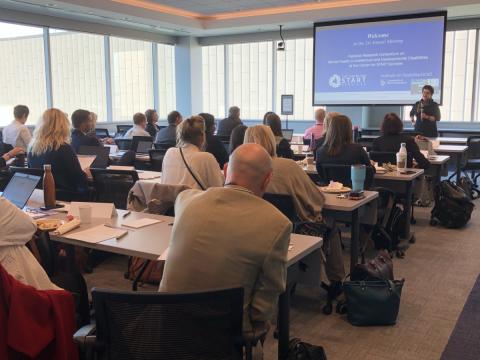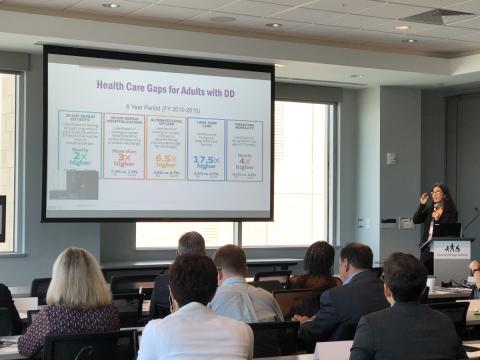
On October 10th, 2019 the Center for START Services held its inaugural meeting for the National Research Consortium on Mental Health in Intellectual and Developmental Disabilities (MHIDD) at the Kennedy Krieger Institute in Baltimore, Maryland. The mission of the Consortium is to advance research in best practice and policy to promote well-being in people with MHIDD.

The Director of the Consortium is Joan B. Beasley, Ph.D., Research Associate Professor at the University of New Hampshire, and Director of the Center for START Services at the UNH Institute on Disability/UCED. The Consortium Chair is Luke Kalb, PhD, Assistant Professor at the Kennedy Krieger Institute and John’s Hopkins University, and the Director of Consortium Operations is Andrea Caoili, LCSW, Director of Research and Quality Assurance at the Center for START Services at the UNH Institute on Disability/UCED.
The National Research Consortium on MHIDD is comprised of people with lived experiences (including self-advocates and family members), caregivers, trainees, researchers, policy experts, and clinicians from over 30 organizations across the US including several UCEDDs, medical schools, state health departments, and service providers.

The day began with keynote speaker, Dr. Yona Lunsky, Director of the Azrieli Adult Neurodevelopmental Centre and Professor in the Department of Psychiatry at the University of Toronto. Dr. Lunsky gave an inspiring talk about how to engage in evidenced-based programs (EBPs) in MHIDD with examples from around the globe, with respondent Dr. Angela Hassiotis, professor in the Division of Psychiatry at University College London, who provided a brief overview of work taking place in the UK. Each of the sponsoring members of the Consortium discussed their vision for our work together. The remainder of the day was spent in roundtable breakout sessions, each focused on one of six top priority areas identified by Consortium members: advancing EBPs, services and linkages, trauma informed care, crisis interventions, advocacy, and integrated care.
The day concluded with strategic planning incorporating specific projects that draw on the Consortium’s considerable expertise to address the identified areas of focus. Next steps are underway and include reviews for potential projects discussed during the inaugural meeting. The Consortium will pursue at least 2 research projects during the upcoming calendar year.
